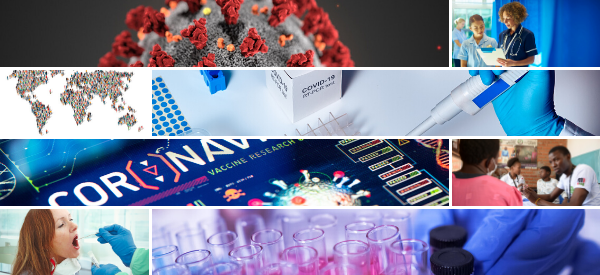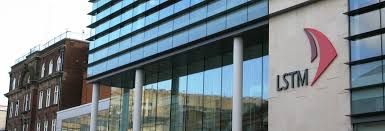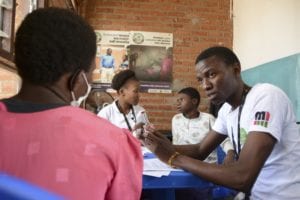TRUE INTERNATIONAL HEROES:
HOW THE LIVERPOOL SCHOOL OF TROPICAL MEDICINE IS FIGHTING CORONAVIRUS
The recent outpouring of love and appreciation we have witnessed towards our nation’s NHS workers has been incredible, but we should also be highly appreciative towards the men and women who are hard at work to fight the virus in a less frontline but equally formidable way.

As the world reacts to the devastating death toll and wider societal ramifications presented by the coronavirus (CODIV-19) pandemic, Liverpool School of Tropical Medicine (LSTM) have been working behind the scenes, since January, to fight the spread of the virus.
If you have been following the news, you will know that one of the biggest global issues when it comes to fighting the bug is testing, or to be more precise, a lack of testing, with long delays between having the test and getting the results.
This diagnostic delay of up to four to five days is preventing nations across the globe from really comprehending and planning for the actual scale of the problem and puts a far greater number of people at risk, including health care providers, which exacerbates the issue of over congested hospitals with not enough staff.
This seriousness of this problem prompted the World Health Organisation to urge international governments to “test, test, test” to prevent death tolls reaching predicted, catastrophic ‘spikes’ in the number of fatalities.
In short, what the world needs right now, perhaps more than anything else, is superfast, efficient testing for coronavirus and LSTM are already way ahead of us. Last week the world-renowned organisation announced that its scientists and researchers are working around the clock to manufacture a new test for the virus that could tell someone within just 10 minutes if they are carrying it.

Liverpool School of Tropical Medicine
Back in January, before the pandemic had taken grip on the world, LSTM staff redeployed to China, the initial sources and only known location of the norovirus bug, at the time, making vital Chinese contacts and partnering with China’s industrial partners who were developing tests that could be used for people at the point of care or the point of need.
Developing fast-acting, ten-minute tests for a virus like COVID-19 would usually take months, if not years, but due to the swift actions and hard work of LSTM, the organisation believes it could have a suitable product developed in a number of weeks, helping the world, not just Liverpool to curtail the pandemic and save countless lives.
Of course, diagnostics are simply just the first step in treating and eventually curing and preventing COVID-19 and LSTM are involved in all aspects of the response to the virus. Today LSTM announced that it has become a key partner in publishing COVID-19 knowledge evidence and learning development summaries, signposting the UK Government towards the latest information and discourse to fight the pandemic and its ongoing consequences.
 Yesterday LSTM joined a new global coalition to accelerate research on the prevention and treatment of COVID-19 in low- and middle-income countries. On Wednesday LSTM launched a fundraising appeal to support COVID-19 research and response in Malawi.
Yesterday LSTM joined a new global coalition to accelerate research on the prevention and treatment of COVID-19 in low- and middle-income countries. On Wednesday LSTM launched a fundraising appeal to support COVID-19 research and response in Malawi.
The day before that, LSTM revealed that its respiratory clinical research group is conducting key COVID-19 research in patients & healthcare workers, specifically around potential links between pneumococcal pneumonia and COVID-19; and it’s safe to say that we can expect LSTM to tackle the pandemic on many more fronts during the coming weeks and months, if not years.
After all, LSTM are no stranger to developing new, revolutionary ways to tackle global disease. In fact, they have been breaking the cycle of poor health and poverty and fighting infectious, debilitating and disabling diseases since 1898.

LSTM Patient recruitment
Chikwawa Hospital, Malawi
LSTM’s work in combating diseases such as TB, HIV/AIDS, malaria, dengue and lymphatic filariasis is supported by a research order book of well over £210 million.
The organisation’s international reputation and the calibre of their research has secured funding to lead more than 10 international consortia and product development partnerships aimed at reducing or eliminating the impact of diseases upon the world’s poorest people.
As a teaching institution, LSTM continues to develop new drugs, vaccines and pesticides from its state-of-the-art facilities in Liverpool, which put them at the forefront of infectious disease research, attracting more than 600 students from 68 countries, from PhD research and Masters programmes to a range of professional courses, training the next generation of doctors, scientists, researchers and health professionals.
Planning, researching, partnering, educating and thinking of bright ideas to prepare for dark times ahead is what LSTM does best, they are true heroes and we should be incredibly proud of the work the organisation is doing and has done for more than a hundred years.
Unprecedented. Challenging. Uncertain. Whatever you want to call these times we are in, with the dedication, talent and sheer ingenuity of scientists and researchers like those in the Liverpool School of Tropical Medicine, the world will fight this pandemic with everything we’ve got and we will beat this virus, saving untold lives and returning the world to a recognisable place where people can live full, open, productive and sociable lives.
For more information on LSTM visit lstmed.ac.uk/

